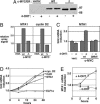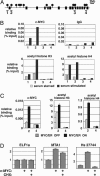Metastasis-associated protein 1 (MTA1) is an essential downstream effector of the c-MYC oncoprotein
- PMID: 16172399
- PMCID: PMC1236531
- DOI: 10.1073/pnas.0502330102
Metastasis-associated protein 1 (MTA1) is an essential downstream effector of the c-MYC oncoprotein
Abstract
The c-myc oncogene is among the most commonly overexpressed genes in human cancer. c-myc encodes a basic helix-loop-helix/leucine zipper (bHLH/LZ) transcription factor (c-MYC) that activates a cascade of downstream targets that ultimately mediate cellular transformation. Although a large number of genes are regulated by c-MYC, only a few have been functionally linked to c-MYC-mediated transformation. By expression profiling, the metastasis-associated protein 1 (MTA1) gene was identified here as a target of the c-MYC oncoprotein in primary human cells, a result confirmed in human cancer cells. MTA1 itself has been previously implicated in cellular transformation, in part through its ability to regulate the epithelial-to-mesenchymal transition and metastasis. MTA1 is a component of the Mi-2/nucleosome remodeling and deacetylating (NURD) complex that contains both histone deacetylase and nucleosome remodeling activity. The data reported here demonstrate that endogenous c-MYC binds to the genomic MTA1 locus and recruits transcriptional coactivators. Most importantly, short hairpin RNA (shRNA)-mediated knockdown of MTA1 blocks the ability of c-MYC to transform mammalian cells. These data implicate MTA1 and the Mi-2/NURD complex as one of the first downstream targets of c-MYC function that are essential for the transformation potential of c-MYC.
Figures





Similar articles
-
The role of the MTA family and their encoded proteins in human cancers: molecular functions and clinical implications.Clin Exp Metastasis. 2009;26(3):215-27. doi: 10.1007/s10585-008-9233-8. Epub 2008 Dec 31. Clin Exp Metastasis. 2009. PMID: 19116762 Review.
-
Heat shock factor 1 represses estrogen-dependent transcription through association with MTA1.Oncogene. 2008 Mar 20;27(13):1886-93. doi: 10.1038/sj.onc.1210834. Epub 2007 Oct 8. Oncogene. 2008. PMID: 17922035
-
Identification of novel targets of MYC whose transcription requires the essential MbII domain.Cell Cycle. 2006 Feb;5(3):238-41. doi: 10.4161/cc.5.3.2409. Epub 2006 Feb 1. Cell Cycle. 2006. PMID: 16434883
-
MTA1-mediated transcriptional repression of BRCA1 tumor suppressor gene.Oncogene. 2008 Mar 27;27(14):1971-80. doi: 10.1038/sj.onc.1210839. Epub 2007 Oct 8. Oncogene. 2008. PMID: 17922032 Free PMC article.
-
Clinical implications of MTA proteins in human cancer.Cancer Metastasis Rev. 2014 Dec;33(4):1017-24. doi: 10.1007/s10555-014-9527-z. Cancer Metastasis Rev. 2014. PMID: 25374266 Review.
Cited by
-
Inhibition of 5-lipoxygenase selectively triggers disruption of c-Myc signaling in prostate cancer cells.J Biol Chem. 2015 Feb 20;290(8):4994-5006. doi: 10.1074/jbc.M114.599035. Epub 2014 Dec 24. J Biol Chem. 2015. PMID: 25540201 Free PMC article.
-
A rare DNA contact mutation in cancer confers p53 gain-of-function and tumor cell survival via TNFAIP8 induction.Mol Oncol. 2016 Oct;10(8):1207-20. doi: 10.1016/j.molonc.2016.05.007. Epub 2016 Jun 7. Mol Oncol. 2016. PMID: 27341992 Free PMC article.
-
E3 ubiquitin ligase COP1 regulates the stability and functions of MTA1.Proc Natl Acad Sci U S A. 2009 Oct 13;106(41):17493-8. doi: 10.1073/pnas.0908027106. Epub 2009 Sep 24. Proc Natl Acad Sci U S A. 2009. PMID: 19805145 Free PMC article.
-
Identification of differential expressed transcripts in cervical cancer of Mexican patients.Tumour Biol. 2011 Jun;32(3):561-8. doi: 10.1007/s13277-010-0151-4. Epub 2011 Jan 13. Tumour Biol. 2011. PMID: 21225484
-
Structure, expression and functions of MTA genes.Gene. 2016 May 15;582(2):112-21. doi: 10.1016/j.gene.2016.02.012. Epub 2016 Feb 9. Gene. 2016. PMID: 26869315 Free PMC article. Review.
References
-
- Nesbit, C. E., Tersak, J. M. & Prochownik, E. V. (1999) Oncogene 18, 3004–3016. - PubMed
-
- Nilsson, J. A. & Cleveland, J. L. (2003) Oncogene 22, 9007–9021. - PubMed
-
- Cole, M. D. & McMahon, S. B. (1999) Oncogene 18, 2916–2924. - PubMed
-
- Lewis, B. C., Prescott, J. E., Campbell, S. E., Shim, H., Orlowski, R. Z. & Dang, C. V. (2000) Cancer Res. 60, 6178–6183. - PubMed
Publication types
MeSH terms
Substances
Grants and funding
LinkOut - more resources
Full Text Sources
Other Literature Sources
Research Materials
Miscellaneous

